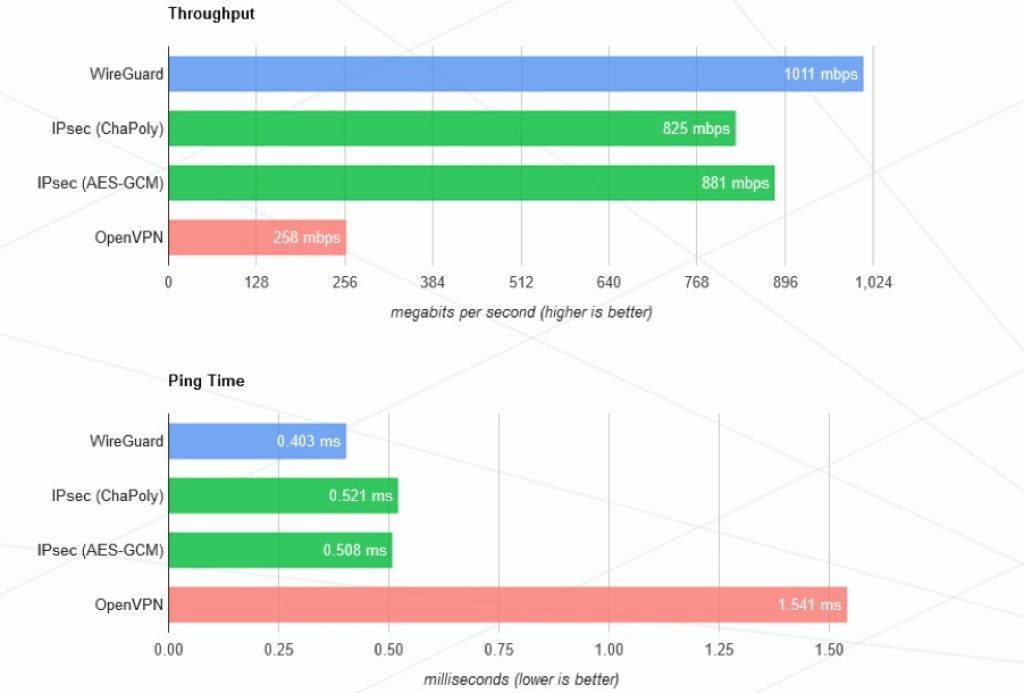Virtual Private Networks (VPNs) use security protocols to provide a secure connection to the Internet. WireGuard and OpenVPN are currently considered the best protocols in the VPN industry.
OpenVPN hit the market in 2001 and has since been considered the industry standard for privacy and security.
WireGuard, introduced in 2019, has conquered the commercial VPN industry due to its high speed and impressive security credentials. WireGuard’s main goals are to improve existing VPN protocols through simplicity, speed, ease of use, and reduced attack surface.
Performance Comparison
WireGuard runs in kernel space while OpenVPN runs in user space, which gives the former a speed advantage. This is because when using OpenVPN, data packets are constantly being copied between different spaces and the OpenVPN background service needs to be running constantly.
In throughput tests, CPU utilization reached 100% when using OpenVPN. Whereas using WireGuard did not result in such a high CPU load, allowing the resources of the Gigabit Ethernet network card to be fully utilized.
In addition, WireGuard provided better mobility compared to OpenVPN. Where OpenVPN has historically had difficulty with network changes, WireGuard handles this seamlessly. For mobile devices, they often use a different protocol, IKEv2, which is a good but closed solution. Thus, WireGuard is a great open source solution to use as a VPN protocol on mobile devices.
Security and Encryption
WireGuard and OpenVPN support multiple secure encryption methods and algorithms, keeping your data protected.
Crypto-agility is the ability of a security system to automatically switch between different encryption algorithms and protocols.
WireGuard does not have crypto-agility because it uses a fixed set of cryptographic algorithms for each version. Not having crypto-agility reduces complexity and potential vulnerabilities such as a man-in-the-middle attack. This makes WireGuard more secure in terms of attack prevention, but less flexible in defense.
On the other hand, OpenVPN is a crypto-flexible protocol capable of using different cryptographic sets. This provides better protection, but the increased complexity increases the surface for potential attacks. The advantage of OpenVPN is that it does not require mandatory updates in the event of an attack, unlike WireGuard.
WireGuard uses versioning to change cryptographic sets when a vulnerability is discovered. This system allows servers to request connections with the new version and ignore older packets, which keeps data protection up to date.
Privacy and Logging
If you are concerned about your privacy, it is important to choose a VPN service with a zero-logging policy that guarantees complete anonymity. This also applies to the VPN protocol that the service uses.
OpenVPN supports a zero-logs policy, which means that it does not keep logs of user activity. On the other hand, WireGuard was designed to keep the allowed IP addresses until the next server reboot.
When using the standard WireGuard protocol, your IP address will most likely be logged. Because of this feature, some VPN providers develop their own protocols based on WireGuard to eliminate privacy concerns.
Mobility and compatibility
In today’s world, where we are constantly switching between Wi-Fi and mobile networks, a seamless VPN experience is important.
WireGuard provides a seamless transition between devices and networks, and is compatible with Windows, Android, macOS, iOS, and popular Linux distributions.
OpenVPN faces some issues when switching networks, but supports most computer platforms. In addition to Windows, Android, macOS, and iOS, OpenVPN works with Solaris, QNX, Maemo, FreeBSD, and ChromeOS. This makes it popular with router and firewall manufacturers.
WireGuard isn’t as widely integrated into hardware yet, but you can set it up on any popular Linux distribution. With its excellent mobility and simple code, WireGuard is a better choice than OpenVPN for VPN on mobile devices.
WireGuard vs. OpenVPN: Speed
The actual VPN speed can depend on various factors such as your location, server load and ISP bandwidth.
WireGuard is generally considered faster compared to OpenVPN. This is because WireGuard runs in the kernel space of the operating system, which allows it to utilize resources more efficiently and achieve higher data transfer rates. Whereas OpenVPN runs in user space, which requires additional data processing and can degrade performance.
According to synthetic speed tests conducted by various authors using the iperf3 package, WireGuard can be 50-75% faster than OpenVPN. Ping is also often significantly lower when using WireGuard compared to OpenVPN.

Based on the above graph, WireGuard has better throughput and lower latency than its counterpart.
You can also run speed tests to determine which protocol provides better speeds:
- Close all programs.
- Launch a VPN that supports WireGuard, such as NordVPN.
- Connect to different servers and measure speeds with Speedtest from Ookla.
Conclusion: which VPN to choose?
There are many VPN usage scenarios and recommendations can vary greatly depending on your needs. We can distinguish two main groups of users with the most suitable VPN solutions.
- For regular users. If you need a VPN to bypass geographical restrictions or for a fast internet connection, especially when working with files or applications, choose WireGuard.
- For business users. Medium and large companies that use VPN for remote access to the internal network or sharing sensitive data often prefer OpenVPN for its reliability and time-tested solutions.
Well, you already know which VPS to buy for VPN.






